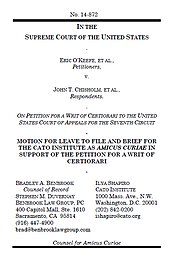Learn more about Cato’s Amicus Briefs Program.
SWAT teams—police units equipped with military-style weaponry and trained to deal with the most dangerous of criminals—were first created police realized that patrolmen equipped with revolvers and batons are generally able to keep the peace, they lack the resources and skills to deal with riots, urban terrorism, and other exotic crime. Since then, SWAT-style paramilitary units have been deployed to rescue hostages, end bank robberies, secure campuses after school shootings, and, in Wisconsin, to raid the houses and offices of people the state believed to be guilty of exercising their rights under the First Amendment. That’s right: in the last few years, SWAT raids were part of a wide-ranging (politically motivated) investigation into whether certain unknown individuals—“John Does”—were violating campaign finance laws. Some of these John Does objected and challenged the validity of the subpoenas requiring them to turn over their records to the district attorney’s office. The state trial court agreed and quashed the subpoena, finding that the state had no reason to believe that any violation of state law had occurred, or that the records taken would contain relevant evidence. Unsatisfied, the DA appealed the judge’s order. Rather than continuing this battle through the state courts, these John Does sued the state officials responsible for the investigation in federal court. They claimed that the investigation was a speech-chilling violation of their First Amendment rights and asked for a federal injunction preventing the state from pursuing the investigation. The state argued that a federal law—the Anti-Injunction Act—prevents federal courts from ordering states to abandon in-progress criminal cases. Nevertheless, the district court issued an order stopping the SWAT-style fishing expedition, relying on a series of Supreme Court cases holding that the AIA doesn’t apply where the prosecution is known by the state to be baseless, is part of a campaign of harassment, or involves the enforcement of a blatantly unconstitutional law. The judge concluded that Wisconsin’s campaign-finance laws, as well as the methods used to enforce them, violated the First and Fourteenth Amendments. The U.S. Court of Appeals for the Seventh Circuit reversed the district court’s order, however, concluding that since the state campaign-finance laws had not yet been declared unconstitutional—and their constitutionality was not directly before the district court—the AIA exceptions didn’t apply and the injunction was improper. In short, Wisconsin will be allowed to continue its investigation, the constitutionality of which is immune from legal challenge in federal court. In effect, the Seventh Circuit held that that under the AIA, the only time defendants can challenge the constitutionality of a state’s criminal laws is “when no state prosecution [is] pending.”
Cato has filed an amicus brief urging the Supreme Court to hear the plaintiffs’ appeal. We argue that regardless of whether Wisconsin’s election laws are unconstitutional, there was sufficient evidence suggesting that the sole purpose of the investigation was to harass the plaintiffs and discourage them (and others) from advocating a particular legislative agenda. Because the Supreme Court’s interpretation of the AIA allows federal judges to halt state enforcement of undeniably constitutional laws where there is evidence that a prosecution is being conducted for an improper purpose (like silencing political dissent), or in a manner that constitutes harassment, the district court had the power to issue an injunction regardless of whether or not Wisconsin’s campaign-finance laws are constitutional. The fact that the constitutionality of those laws is in doubt—it happens to be one of the most heavily contested questions currently before the courts—only makes the district court’s decision all the more proper and the Seventh Circuit’s all the more worrying. If allowed to stand, the long-term effect of the Seventh Circuit’s ruling would be to give prosecutors carte blanche to do exactly what Wisconsin’s politically inspired prosecutors did: “investigate” perceived political threats for the very purpose of suppressing political speech. So long as arrests are never made and claims are never brought, the prosecutors are in the clear and no federal court can do anything about it. That can’t be the law.

This work is licensed under a Creative Commons Attribution-NonCommercial-ShareAlike 4.0 International License.
